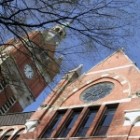Students and guests of the Wittenberg Series will be afforded the opportunity to pick the brain of 1986 Nobel Laureate in Chemistry Dudley Herschbach, Harvard University professor emeritus of science, when he visits Wittenberg University to present the IBM Endowed Lecture in the Sciences. Herschbach's lecture, "The Impossible Takes a Little Longer," will begin at 7:30 p.m. Tuesday, Nov. 9, in the Health, Physical Education and Recreation Center.
His talk will discuss improving science education at all levels in the United States and will feature observations gathered in the more than two decades of working with students and faculty in the scientific arena. Aspects of the scientific enterprise, including the practical value of curiosity-driven research and the kinship of science and the humanities as liberal arts, will be presented. Questions from the audience will also be encouraged.
Herschbach was invited to Wittenberg after Mark Ellison, assistant professor of chemistry, suggested to the Series planning committee that it had been far too long since a chemist had been selected as an IBM Endowed Lecture in the Sciences speaker. "When thinking of who to invite, I thought who better to excite interest in the sciences than a Nobel Prize winner?" Ellison said.
Ellison admits he had trouble getting to sleep the night Herschbach accepted his invitation to speak at Wittenberg. He was doubly pleased that the noted chemist also agreed to spend the next day visiting science classes. Herschbach will offer a more technical talk titled "Maxwell's Demon: From Orienting Molecules to Turning Motor Enzymes" at 3 p.m. Wednesday, Nov. 10, in Bayley Auditorium inside the Barbara Deer Kuss Science Center. Both presentations are free and open to the public.
A brilliant scholar with a diverse background, Herschbach has an entry in an encyclopedia, and his work and research fill the World Wide Web. Last November, Herschbach lent his voice to the "Treehouse of Horror" episode of TV's The Simpsons. As a student, he played football for Stanford University and was invited to try out with the then Los Angeles Rams. In 1998, he was named by Chemical & Engineering News among the 75 leading contributors to the chemical enterprise in the past 75 years. He teaches graduate courses in quantum mechanics, chemical kinetics, molecular spectroscopy and collision theory.
Herschbach continues to teach entering freshmen general chemistry. "Considering his degree of expertise, I think his choice to teach students at that level is quite remarkable and speaks to his character. I admire his obvious passion for education and I think people who come to hear him speak at Wittenberg will gain greatly from the experience," Ellison said.
In addition to being the 1986 Nobel Laureate in Chemistry, Herschbach has been the recipient of numerous awards and honors. Born in San Jose, Calif., he received his B.S. in mathematics in 1954 and M.S. in chemistry in 1955 at Stanford University, followed by his A.M. in physics in 1956 and Ph.D. in chemical physics from Harvard in 1958.
Herschbach is passionate about improving pre-college science education in the United States and currently chairs the board of trustees of Science Service, publishers of Science News. Herschbach is currently researching methods of orienting molecules for studies of collision stereodynamics and means of slowing and trapping molecules to examine chemistry at long wavelengths.
Funded by a gift to Wittenberg from the IBM Corporation in 1982, the goal of this annual IBM lecture is to enhance the role and image of science on a liberal arts campus and to bring about a larger understanding and appreciation of science as a crucial contemporary endeavor. For more information about the events of the Wittenberg Series, call Gwendolyn Scheffel, Series coordinator, (937) 327 -7918.






